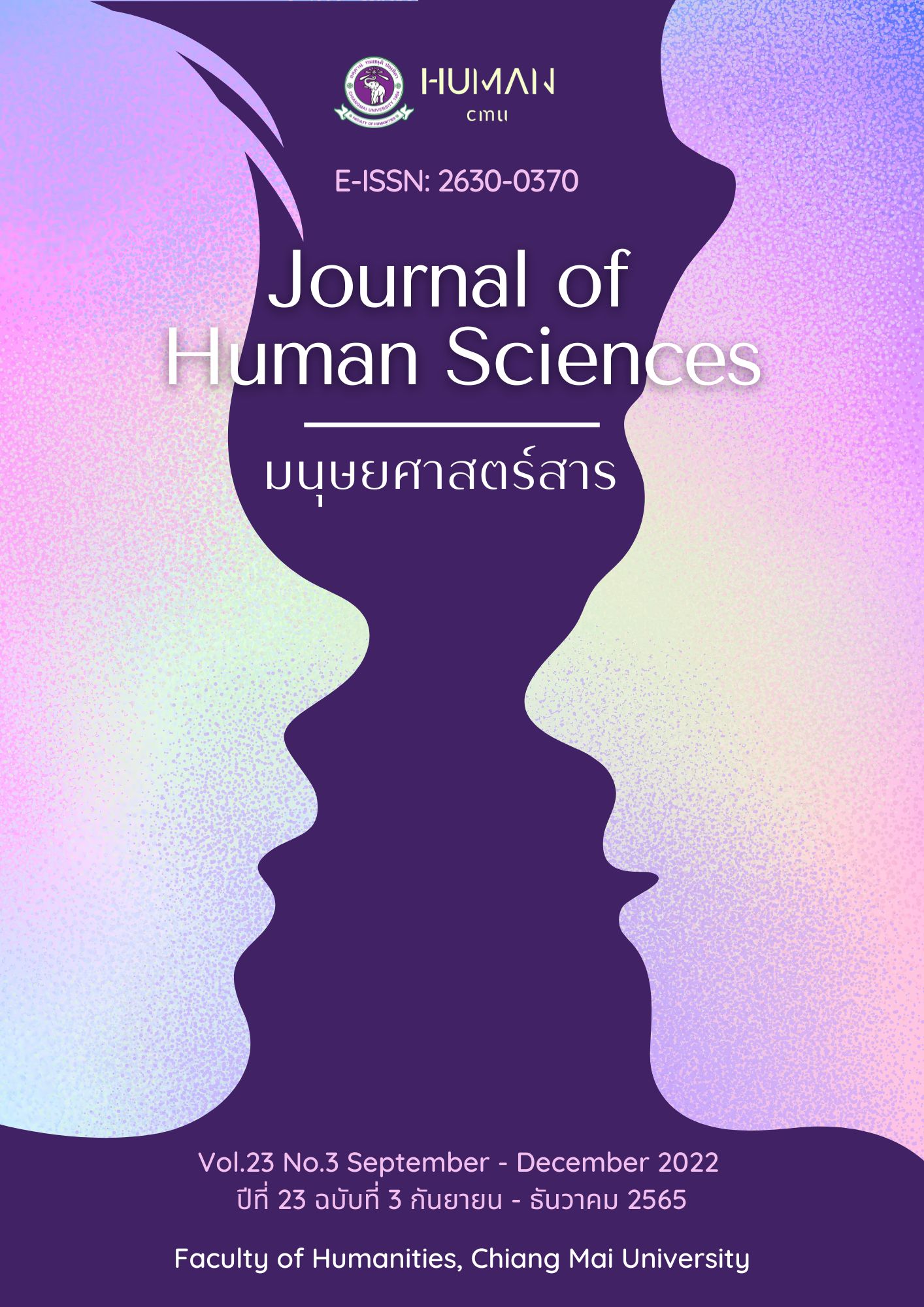กลวิธีการแปลวรรณคดีจีนอีโรติกเรื่อง จินผิงเหมย์ เป็นภาษาไทย โดยเนียนและสด กูรมะโรหิต
Main Article Content
บทคัดย่อ
งานวิจัยฉบับนี้ศึกษา ดอกเหมยในแจกันทอง ซึ่งเป็นบทแปลภาษาไทยของ จินผิง วรรณคดีจีนสมัยราชวงศ์หมิงในสามประเด็น ได้แก่ การแปลฉากสังวาส การแปลบทเพลงและกวีนิพนธ์ และการแปลคำทางวัฒนธรรม วัตถุประสงค์ในการศึกษา นอกจากเพื่อวิเคราะห์กลวิธีการแปลในสามประเด็นดังกล่าวแล้ว ยังได้ศึกษาอิทธิพลที่สังคมในขณะนั้นมีต่อการแปล โดยอ้างอิงทฤษฎีการเขียนใหม่ (rewriting) ของอ็องเดร เลอเฟอแวร์ (André Lefevere) ซึ่งประกอบด้วยสามปัจจัยหลัก ได้แก่ อุดมคติ (ideology) ประพันธศาสตร์ (poetics) และผู้อุปถัมภ์ (patronage) เป็นกรอบในการวิเคราะห์
ผลการศึกษาพบว่า ปัจจัยด้านสภาพแวดล้อมที่ส่งผลกระทบต่อการแปล ดอกเหมยในแจกันทอง ในสามประเด็นข้างต้นแตกต่างกันออกไป โดยด้านอุดมคติ ส่งผลต่อการแปลฉากสังวาส เพราะสังคมไทยสมัยนั้นมองเรื่องเพศเป็นสิ่งที่ควรปกปิด ส่งผลให้ผู้แปลเลือกที่จะใช้คำที่ให้ความรู้สึกเย้ายวน ตัดทอนรายละเอียด แทนที่จะแปลฉากสังวาสใน จินผิงเหมย์ อย่างตรงไปตรงมา ปัจจัยด้านประพันธศาสตร์ สะท้อนให้เห็นผ่าน การเรียบเรียงเนื้อหาในบทแปลให้กระชับกว่าต้นฉบับภาษาจีน ที่แม้จะไม่สอดคล้องกับประพันธศาสตร์ของวรรณกรรมแปลในปัจจุบัน หากกลับเป็นแนวปฏิบัติที่แพร่หลายในยุคที่ ดอกเหมยในแจกันทอง ถูกผลิตออกมา สำหรับด้านผู้อุปถัมภ์ ซึ่งได้แก่หนังสือพิมพ์ แสนสุข และผู้อ่านในขณะนั้น อาจเป็นส่วนหนึ่งที่ทำให้ ดอกเหมยในแจกันทอง ต้องยุติการเผยแพร่ไปก่อนที่เนื้อหาจะจบ ทั้งยังมีการรวบเนื้อหาอย่างชัดเจนในระยะหลังของการเผยแพร่
Article Details

อนุญาตภายใต้เงื่อนไข Creative Commons Attribution-NonCommercial-NoDerivatives 4.0 International License.
เอกสารอ้างอิง
Asawawongkasem, P. (2018). Rư̄ang phēt kap kān sensœ̄ : kān plǣ phāsā tō̜nghām nai
nawaniyāi rư̄ang Fifty Shades of Grey khō̜ng E. L. James [Sex and Censorships: Translating Taboo languages in E.L. James’ Fifty Shades of Grey]. Journal of Translation and Interpretation Thailand 3(2): 90 - 137. Retrieved from https://so04.tci-thaijo.org/index.php/JTIT/article/view/244613
Baker, M. (1992). In Other Words: A coursebook on translation. London; New York:
Routledge.
Chittiphalangsri, P. (2019). From plagiarism to incense sticks: The making of self and the other
in Thai translation history. In Yves Gambier and Ubaldo Stecconi (Eds), A World Atlas
of Translation (pp. 105 – 124). Amsterdam: John Benjamins.
Huang, L. (1991). Jin Ping Mei da cidian [Jin Ping Mei’s Dictionary]. Chengdu: Bashu.
https://mall.cnki.net/reference/read_r200605107.html
Hung, A. (1999). Fanyi·Wenxue·Wenhua [Translation·Literature·Culture]. Beijing: Peking
University Press.
Huo, X. (2003). Jin Ping Mei xing miaoxie de chaoyue yu shiwu [The Transcendence and
Mistakes in the Sex Scenes in Jin Ping Mei]. Gudian wenxue zhishi [Knowledge on
Literary Classics] 5: 92-95.
Kurmarohita, N. & Kurmarohita, S. (1953, March 8 – 1955, October 8). Dō̜k mœ̄i nai čhǣkan
thō̜ng [The Plum in the Golden Vase]. Sǣn suk [Happiness].
Kurmarohita, S. (1994). čhetsipsām pī khō̜ng mittraphāp [73 Years of Friendship]. in Yā khō̜p
ʻanusō̜n [In Memory of Jacob] (pp. 53 – 67). Bangkok: Dokya.
Lanlingxiaoxiaosheng. (2011). Gaohetang piping di yi qishu Jin Ping Mei [Gaohetang’s Critism
of Jin Ping Mei, the Greatest Book of All]. Changchun: Jilin University Press.
Lefevere, A. (1982). Mother Courage’s Cubumbers: Text, System and Refraction in a Theory of
Literature. Modern Language Studies 12(4): 3-20.
Lefevere, A. (2004). Translation, rewriting and the manipulation of literary fame. Shanghai:
Shanghai Foreign Language Education Press.
Li, S. (2018). Pan Jinlian de jiaozi [Pan Jinlian’s Dumplings]. Beijing: Chu Chen Books.
Macmillan English Dictionary : for Advanced Learners (2nd ed.). (2007). Oxford: Macmillan
Education.
Pakdekham, S. & Pakdekham, N. (2008). Buppha nai kunthī thō̜ng : wannakam Čhīn chabap
"yā khō̜p" thī plǣ mai čhop? [Buppha Nai Kunthi Thong: the Unfinished Thai
Translation of a Chinese Literary Work by Jacob]. Sinlapa watthanatham [Arts and
Culture] 29(7): 160 – 169.
Phrarātchabanyat kānphim Phō̜.Sō̜. sō̜ngphansīrō̜ipǣtsipsī [Printing Act 1941]. (1941,
September 30th). Royal Thai Gazette Vol. 58. Page 1228 – 1257.
Qiu, H. & Zhang, Q. (2018). Jin Ping Mei banben tujian [An Illustrated Guide to Various Editions
of Chin Ping Mei]. Beijing: Peking University Press.
Ra rin. (1953, April 19). Botbannāthikān [From the Editor]. Sǣn suk [Happiness]: n.p.
Shi, X. & Luo, Z. (2017). Jin Ping Mei banben zhijian Lu [Different Versions of Jin Ping Mei as
We Have Known and Seen]. Beijing: National Library of China Publishing House.
Suksai, W. (2011). Wiwatthanākān wannakam Čhīn nai phāsā Thai tangtǣ Phō̜.Sō̜.
sō̜ngphansīrō̜isipʻet sō̜ngphansīrō̜ičhetsiphā (tō̜n thī 2) [The Evolution of Chinese
Literature in the Thai language, from1868 – 1932 (Part II)]. Chinese Studies Journal
(4): 131 - 176. Retrieved from https://so01.tci-thaijo.org/index.php/CSJ/article/
view/55101
Wiratpokee, P. (2017). The Writer as Translator: An Analysis of the Novelist Jacob’s
Manipulation in the Thai Translation of Jin Ping Mei. Translation and Compilation
Review 10 (1): 39-82. Retrieved from https://ctr.naer.edu.tw/v10.1/ctr100102.pdf
Wiratpokee, P. (2022). Kāndœ̄nthāng klai ʻan sapsō̜n khō̜ng chāk sangwāt čhāk čhin phing sū
dō̜k mœ̄i nai čhǣkan thō̜ng [The Long and Winding Journey of Erotic Scenes from Jin
Ping Mei to Dok Moei Nai Chaekan Thong]. Vacana 10 (1): 118 – 137. Retrieved from
http://rs.mfu.ac.th/ojs/index.php/vacana/article/view/336
Xiandai hanyu cidian (7th edition) [Dictionary of Current Chinese]. (2016). Beijing:
Commercial Press.
Xiaoxiaosheng (1926a). Guben Jin Ping Mei – di yi ce [Jin Ping Mei, the Ancient Version:
Volume I]. Shanghai: Shanghai Qingyun Publishing Company. Retrieved from
http://shanben.ioc.u-tokyo.ac.jp/main_p.php?nu=D8650300&order=rn_no&no=04543
Xiaoxiaosheng (1926b). Guben Jin Ping Mei – di yi ce [Jin Ping Mei, the Ancient Version:
Volume II]. Shanghai: Shanghai Qingyun Publishing Company. Retrieved from
http://shanben.ioc.u-tokyo.ac.jp/main_p.php?nu=D8650300&order=rn_no&no=04543


